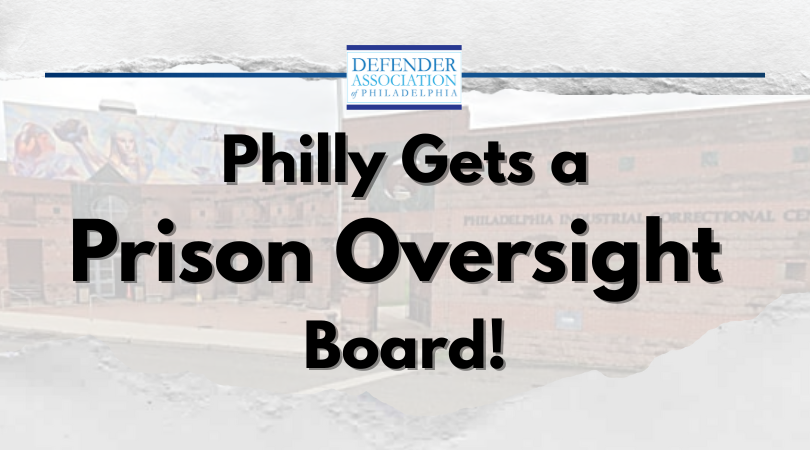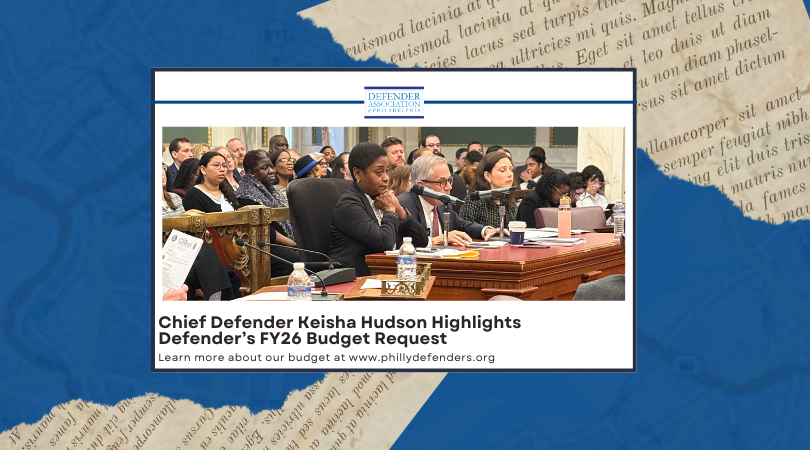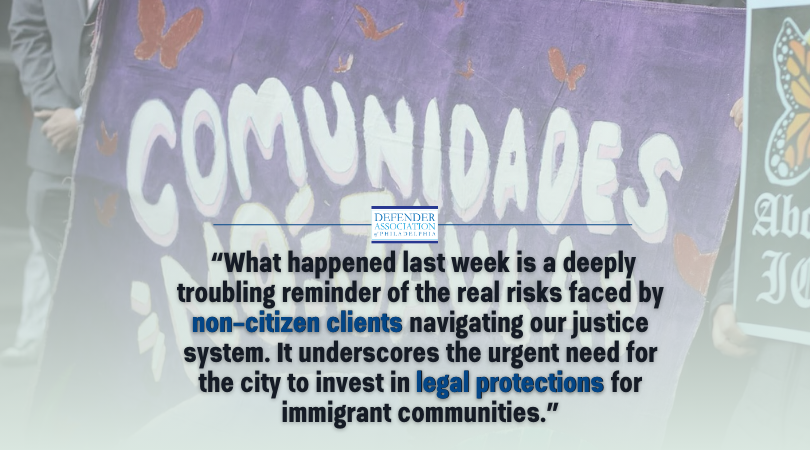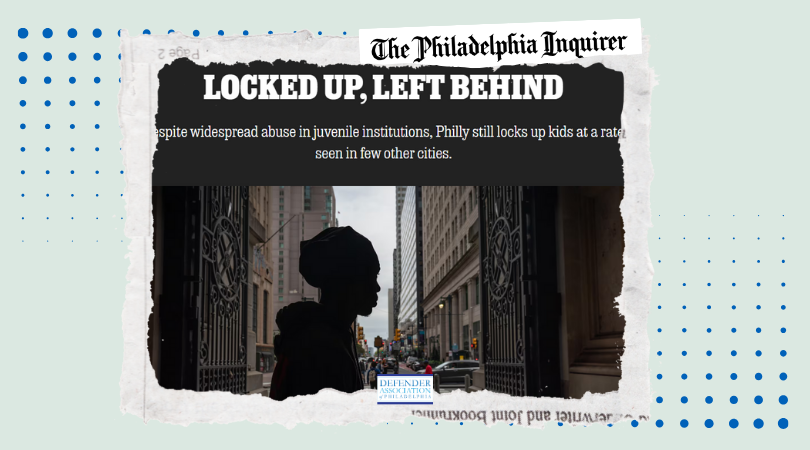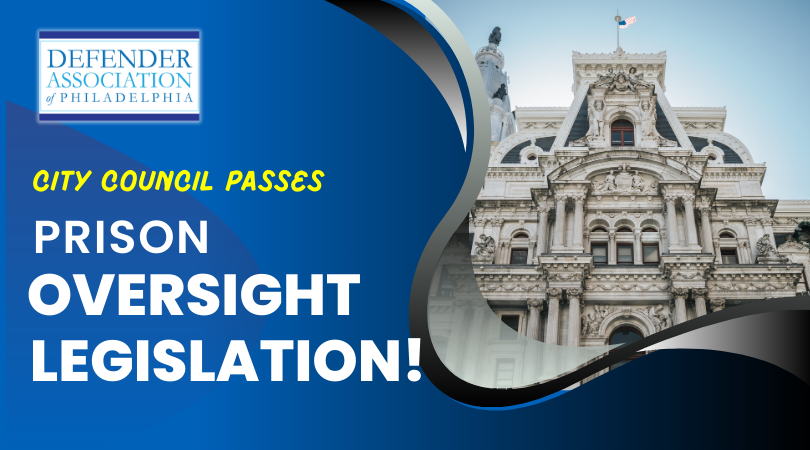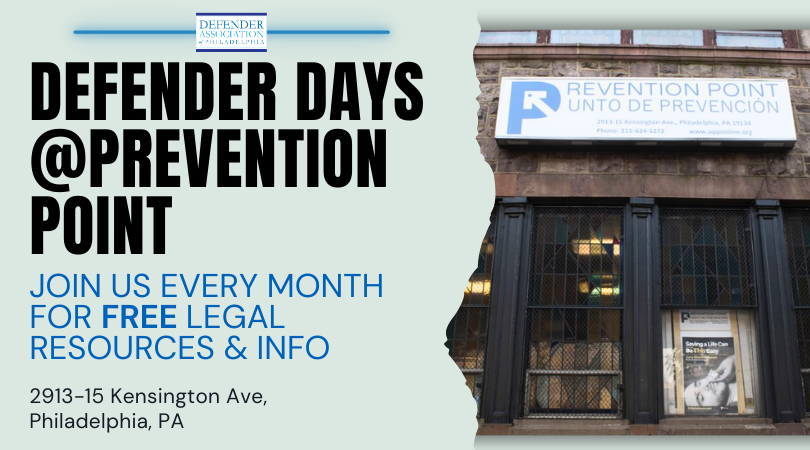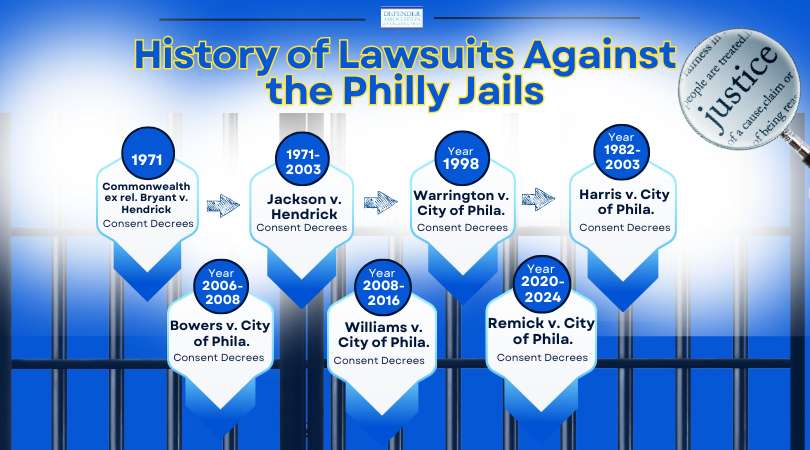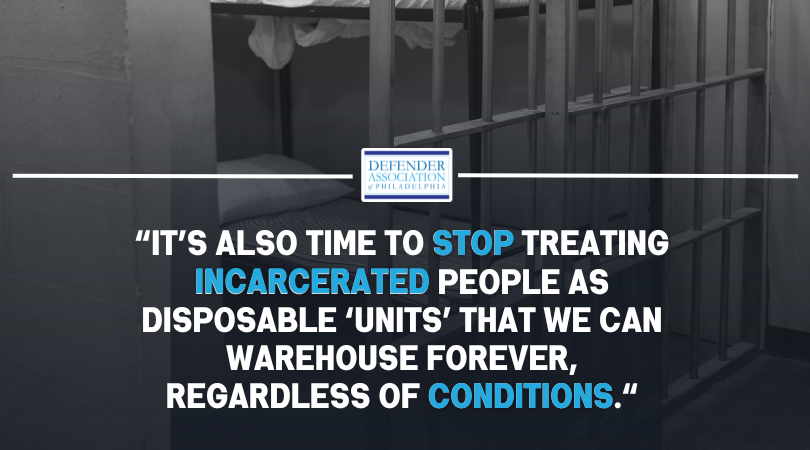Full Testimony (as submitted for the record)
Good afternoon. My name is Thomas Innes, and I serve as the Director of Prison Advocacy at the Defender Association of Philadelphia. On behalf of the Defender Association, I would like to thank Majority Leader Gilmore Richardson, bill sponsors Majority Whip Thomas, Minority Whip O’Rourke, and all members of City Council, for inviting the Defender Association to share our testimony in support of Ordinance #240817 and Resolution #240834. These proposals aim to amend the city charter to establish an Office of Prison Oversight and a companion Prison Oversight Board.
This charter change, which creates an independent Prison Oversight Board and Office of Prison Oversight, is about our past, our present, and the future we hope to create. Before discussing the current situation or the future this legislation envisions, I want to share some historical context—one I am uniquely positioned to provide.
In addition to my role as Director of Prison Advocacy, I hold the unofficial title of the Defender Association’s longest-serving attorney. I joined in 1978 as a trial attorney and have been with the organization ever since. In 2000, I formed the Prison Services Unit in response to the conditions my clients were facing in jail. Since then, I’ve been the primary point of contact for our attorneys, clients, and their families as they navigate the county jail system.
Over the past 24 years, I’ve witnessed every change within the jail—from times when the population was close to 10,000 to moments when it dropped to 3,400. I’ve been there through the HIV/AIDS epidemic, COVID-19, changes in staffing levels, and the introduction of privatized medical care. With every shift, I’ve been on the ground, on State Road, solving problems both big and small.
The Problem: Persistent Opacity
One constant remains: the county jail is a persistently opaque institution. This lack of transparency fosters an environment where abuses can occur unchecked. It has also hindered meaningful dialogue between policymakers, corrections staff, and the community about how our city should treat incarcerated individuals.
The physical location of the jail is telling. It sits in a remote corner of the city, difficult to reach by public transit. Public access to the buildings is limited, and information is often tightly controlled. I’m one of the few non-incarcerated individuals who can speak directly to what goes on inside, having seen it firsthand for decades.
The Current Remedy: Litigation
In the absence of independent oversight, the only avenue for addressing conditions in the jail has been systemic litigation—a reactive measure, not a preventative one. I brought an exhibit [Fig. 1] today to show the long history of lawsuits against the city, each ending in a consent decree because there was no defense against the conditions people were forced to endure.
|
(Fig. 1) SYSTEMIC LAWSUITS AGAINST THE PHILADELPHIA JAILS AND CITY OF PHILADELPHIA
|
| Commonwealth ex rel. Bryant v. Hendrick |
1971 |
Consent Decrees* |
| Jackson v. Hendrick |
1971-2003 |
Consent Decrees |
| Warrington v. City of Philadelphia |
1998 |
Consent Decree |
| Harris v. City of Philadelphia |
1982 - 2003 |
Consent Decrees |
| Bowers v. City of Philadelphia |
2006 - 2008 |
Court Orders & Consent Decrees |
| Williams v. City of Philadelphia |
2008 - 2016 |
Consent Decrees |
| Remick v. City of Philadelphia |
2020 - 2024 |
Consent Decree |
| *Consent decrees are settlements reached because the conditions were indefensible. |
Despite the federal oversight, problems persist. In fact, Philadelphia has been under federal consent decrees for 32 of the last 43 years—including the past three years. If litigation alone could have solved these issues, we would not be here today.
A History of Failed Attempts at Oversight
Past efforts at oversight have been largely ineffective. The Board of Trustees, formed years ago, was toothless and powerless, mainly serving to rubber-stamp budget requests from the prison administration. Meetings were mostly conducted in private, with limited public notice or participation. I was a non-voting member on this board and witnessed firsthand the lack of true oversight.
In 2014, the creation of the Philadelphia Department of Prisons as a separate city department brought another attempt at oversight—a Prison Advisory Board. Unfortunately, it was no different. It lacked authority and continued to operate with minimal transparency. Meetings were often inaccessible and limited to those within the administration. Despite–or maybe because of–my extensive knowledge and experience, I was excluded from serving as a Defender representative on that board, and what little oversight existed quickly dissipated.
During the COVID-19 pandemic, the situation worsened as the jails moved from mere opacity to almost complete secrecy. The public and even advocates kept out of the loop. In 2023, the Prison Advisory Board dissolved after growing frustration over its ineffectiveness.
Present-Day Challenges
Today, the situation remains dire. The ongoing federal lawsuit, Remick v. Philadelphia, is still unresolved, with the city under a $25 million contempt order for failing to meet agreed-upon conditions.
[Philadelphia Department of Prisons] Commissioner Michael Resnick, whom I have known for 20 years, is a good man and an extremely capable leader trying admirably to make changes. However, no single person, no matter how competent, can replace the need for a structured, independent oversight body.
The urgent need for independent oversight is underscored by recent events:
Over the past 20 months, more than 20 people have died in Philadelphia’s county jail. These deaths are reviewed internally, and families must hire attorneys to access information. Even then, they often face restrictions on sharing what they’ve learned.
From May 2023 to May 2024, an average of 106 individuals per month were transported from the jail to emergency rooms—over three per day—with no public explanation.
In the same timeframe, 420 incidents of pepper spray use were reported, sometimes occurring multiple times per day, with no external review or justification.
Recent events—a stabbing of a corrections officer just last week and two deaths within the last two months—only add to the urgency for oversight. The community deserves transparency about what happens behind the prison walls.
Commissioner Resnick’s Proposed Alternatives
Commissioner Resnick has suggested alternatives to an independent board, including expanding roles for the Pennsylvania Prison Society and the Defender Association. Obviously, both organizations are excellent choices to take part in oversight. However, neither has the authority or resources required to enact and ensure permanent and meaningful reforms. The Prison Society, for instance, cannot speak to staff or demand records, and it oversees every jail in the state, not just Philadelphia’s. Similarly, the Defender Association lacks the power to require documentation and relies on requests that the jail can simply refuse.
Conclusion
True oversight requires a constant presence inside the jail, with full access to records and the ability to engage directly with staff. The proposed charter change would create an entity capable of this, with the authority and resources to bring genuine accountability.
We must never forget that incarcerated people are, in fact, people. Almost all are citizens of Philadelphia who will be returning to communities, families and loved ones. We can’t simply lock them away and forget about them. As citizens we must do all we can to preserve their health and safety, along with the prison employees who are placed in jeopardy every day due to lack of staffing and resources.
The jails are a public institution, and the public needs and deserves a clearer view of what happens behind their walls. This charter change would shine a bright and steady light where darkness has reigned for far too long.
Thank you for your anticipated support of this initiative.
Click here to download a printable version
